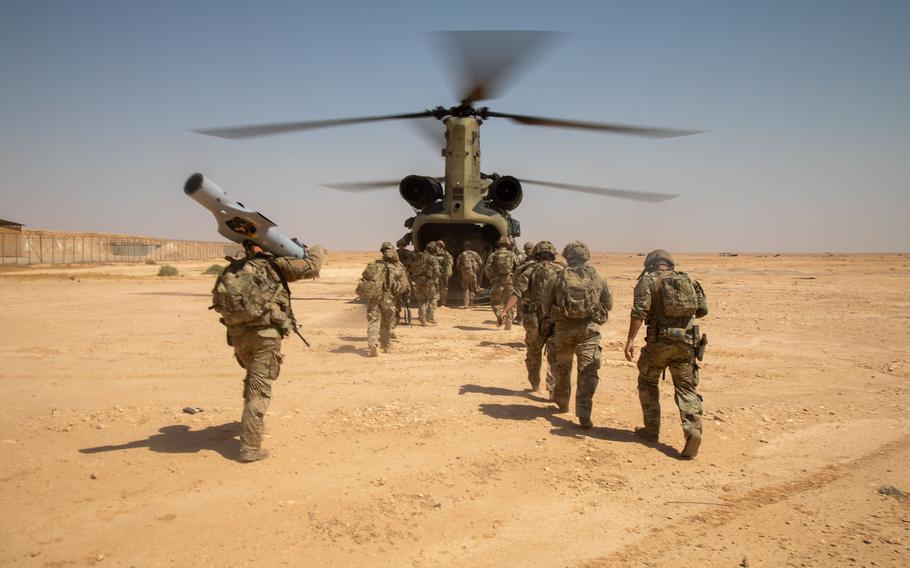
Soldiers assigned to the 37th Infantry Brigade Combat Team, 125th Infantry Regiment, 1st Battalion board a CH-47 Chinook helicopter after a live-fire exercise at al-Asad air base in Iraq in July 2023. (Timothy VanDusen/U.S. Army)
WASHINGTON — U.S. officials will begin talks with the Iraqi government in the coming days about the future of the U.S.-led mission to defeat the Islamic State, including the presence of American troops in the country, Defense Secretary Lloyd Austin announced Thursday.
The two countries agreed to form a Higher Military Commission in August for discussions about the U.S.-led military coalition’s next phase in its mission to defeat ISIS. Factors that will be considered include the threat from ISIS, operational and environmental requirements, and the capability of Iraqi security forces, Austin said in a statement.
“Expert working groups of military and defense professionals will examine these three factors and advise the HMC on the most effective evolution of the D-ISIS coalition mission, ensuring that ISIS can never resurge, in consultation with coalition partners at all stages of the process,” he said.
The announcement comes as tensions throughout the Middle East heat up. The Iraqi Foreign Ministry issued a statement shortly after Austin’s announcement that said these discussions have “a specific and clear timetable that … begin the deliberate gradual reduction of its advisors on Iraqi soil.”
A senior U.S. defense official, who spoke on the condition of anonymity, told reporters that the High Military Commission meeting is not a negotiation about the withdrawal of American forces from Iraq.
“[The number of U.S. troops in Iraq] will certainly be part of the conversations as it goes forward,” Pentagon spokeswoman Sabrina Singh said Thursday. “There are certain factors that have to be met in order for both Iraq and the United States to feel that we can ensure the enduring defeat of ISIS.”
Iraqi Prime Minister Mohammed Shia al-Sudani made headlines this month calling for a drawdown of U.S. forces from the country. The calls have come in response to the U.S. launching airstrikes inside Iraq targeting Iran-backed militants who have been attacking U.S. personnel stationed there.
U.S. forces in Iraq and Syria have been attacked 153 times by Iran-linked militants since October, a military official said Thursday. That includes 61 attacks in Iraq and 92 in Syria.
“There is a need to reorganize this relationship so that it is not a target or justification for any party, internal or foreign, to tamper with stability in Iraq and the region,” Sudani told Reuters on Jan. 10. “Let’s agree on a time frame [for the coalition’s exit] that is, honestly, quick, so that they don’t remain long, and the attacks keep happening.”
After toppling Saddam Hussein’s government in 2003, U.S. forces remained in Iraq fighting insurgent and terrorist groups until the U.S. withdrawal in December 2011, when a status-of-forces agreement with the Iraqi government ran out. At the peak of the war in 2007, the Pentagon had committed some 170,000 troops to Iraq.
In 2014, a new terrorist organization — the Islamic State — launched a blitzkrieg across eastern Syria and into Iraq, capturing massive swaths of both countries, including about one-third of Iraq. Then-U.S. President Barack Obama amassed a U.S.-led coalition to launch an air campaign against ISIS. Later that year, the U.S. began sending forces back into Iraq to train and advise Iraqi military forces to fight off ISIS. That campaign has continued, despite ISIS fighters having lost almost all its land in Iraq by 2017.
The United States declared an end to its combat portion of the anti-ISIS mission in 2021 but retained about 2,500 troops in the country, saying they would remain indefinitely in a support role. Pentagon officials have said the change had little operational impact on the role of U.S. troops in Iraq.
Stars and Stripes reporter Corey Dickstein contributed to this report.